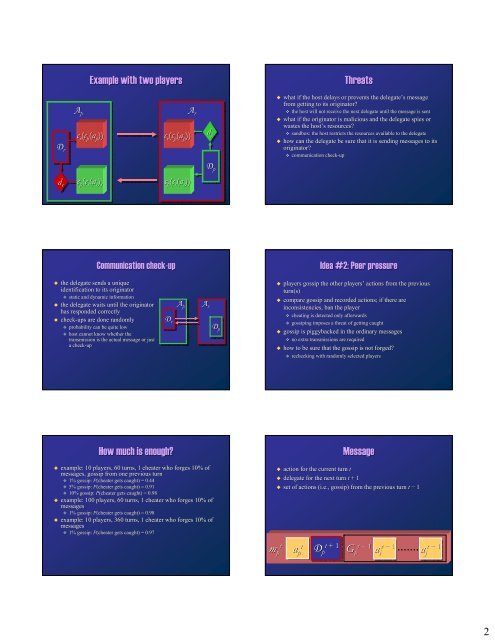Lockstep protocol Lockstep protocol
Lockstep protocol Lockstep protocol
Lockstep protocol Lockstep protocol
Create successful ePaper yourself
Turn your PDF publications into a flip-book with our unique Google optimized e-Paper software.
D rr<br />
d rr<br />
A p<br />
Example with two players<br />
a p<br />
a p<br />
cr(c c p(a p(ap) p)) )) cr(c c p(a p(ap) p)) ))<br />
a r<br />
cp(c c r(a r(ar) r)) ))<br />
Communication check-up check up<br />
the delegate sends a unique<br />
identification to its originator<br />
static and dynamic information<br />
the delegate waits until the originator<br />
has responded correctly<br />
check-ups check ups are done randomly<br />
probability can be quite low<br />
host cannot know whether the<br />
transmission is the actual message or just<br />
a check-up check up<br />
a r<br />
A r<br />
cp(c c r(a r(ar) r)) ))<br />
D rr<br />
How much is enough?<br />
A p<br />
d p<br />
D p<br />
example: 10 players, 60 turns, 1 cheater who forges 10% of<br />
messages, gossip from one previous turn<br />
1% gossip: P(cheater (cheater gets caught) = 0.44<br />
5% gossip: P(cheater (cheater gets caught) = 0.91<br />
10% gossip: P(cheater (cheater gets caught) = 0.98<br />
example: 100 players, 60 turns, 1 cheater who forges 10% of<br />
messages<br />
1% gossip: P(cheater (cheater gets caught) = 0.98<br />
example: 10 players, 360 turns, 1 cheater who forges 10% of<br />
messages<br />
1% gossip: P(cheater (cheater gets caught) = 0.97<br />
A r<br />
D p<br />
Threats<br />
what if the host delays or prevents the delegate’s message<br />
from getting to its originator?<br />
the host will not receive the next delegate until the message is sent<br />
what if the originator is malicious and the delegate spies or<br />
wastes the host’s resources?<br />
sandbox: the host restricts the resources available to the delegate delegate<br />
how can the delegate be sure that it is sending messages to its<br />
originator?<br />
communication check-up check up<br />
Idea #2: Peer pressure<br />
players gossip the other players’ actions from the previous<br />
turn(s)<br />
compare gossip and recorded actions; if there are<br />
inconsistencies, ban the player<br />
cheating is detected only afterwards<br />
gossiping imposes a threat of getting caught<br />
gossip is piggybacked in the ordinary messages<br />
no extra transmissions are required<br />
how to be sure that the gossip is not forged?<br />
rechecking with randomly selected players<br />
Message<br />
action for the current turn t<br />
delegate for the next turn t + 1<br />
set of actions (i.e., gossip) from the previous turn t − 1<br />
m p t<br />
a t<br />
a t<br />
p D<br />
p<br />
Dp<br />
t + 1<br />
p t + 1 + 1 Gp t − 1 − 1 a t − 1<br />
ii t − 1<br />
a t − 1<br />
jj t − 1<br />
2



